Citizenship, Community, and Welfare: An Analysis of UK Education
VerifiedAdded on 2023/06/11
|11
|3066
|412
Essay
AI Summary
This essay explores the intricate relationship between citizenship, community, and welfare within the context of the UK education system. It delves into the evolving conceptions of citizenship and the various forms of welfare provision implemented to support education, examining how these aspects have changed over time. The essay addresses issues of vulnerability, risk, and resilience within the education sector, particularly focusing on the role of the education welfare service in safeguarding children and promoting equal access to quality education. It also applies modernity theories to evaluate the UK's educational welfare system, highlighting its strengths and areas for improvement, such as ensuring inclusivity and non-discrimination. Furthermore, the essay discusses the complexities of British citizenship and its impact on the provision of educational welfare services, considering the diverse categories of citizenship and their associated rights. Finally, the essay touches upon the disciplinary functions of the welfare state as an agent of social surveillance within the educational context.
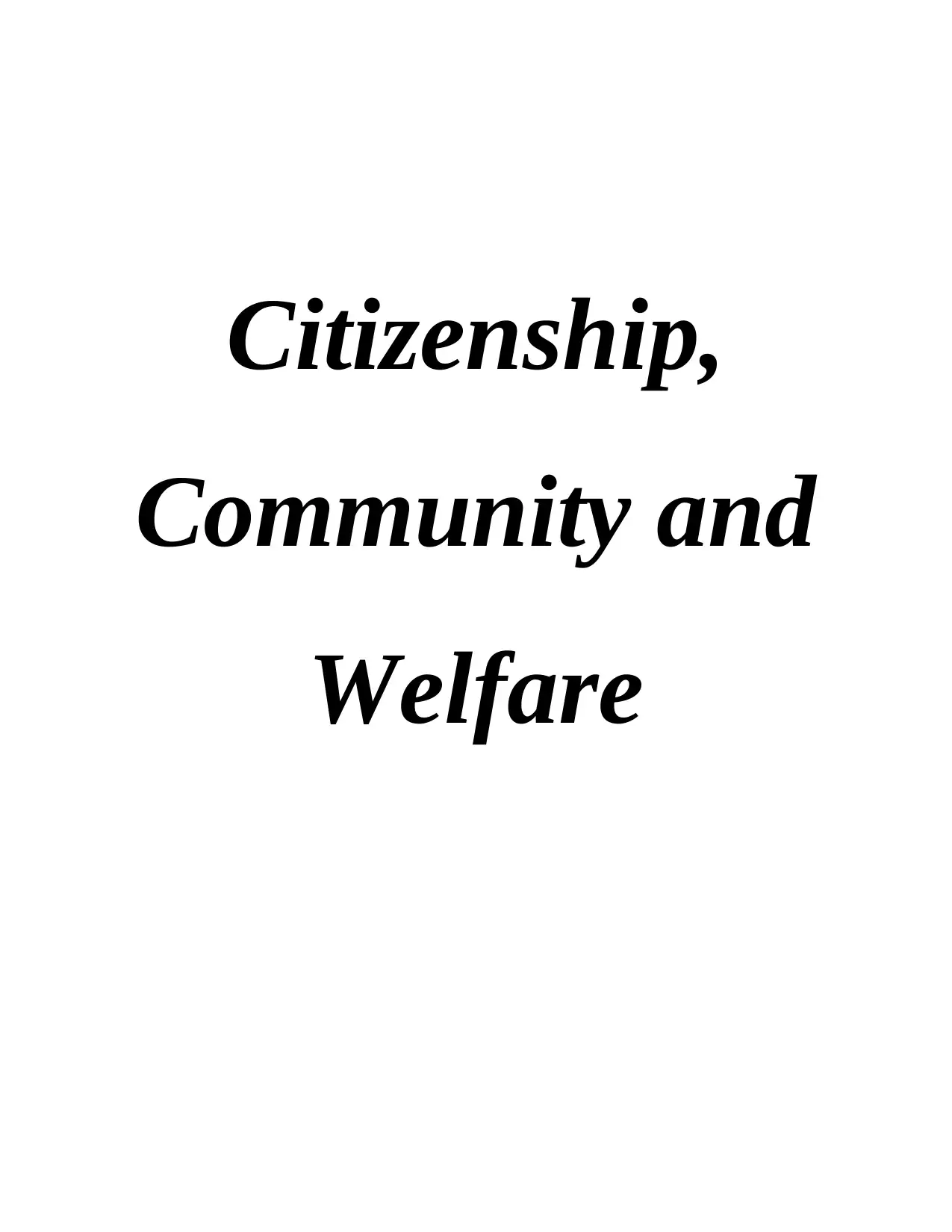
Citizenship,
Community and
Welfare
Community and
Welfare
Paraphrase This Document
Need a fresh take? Get an instant paraphrase of this document with our AI Paraphraser

Contents
INTRODUCTION...........................................................................................................................1
MAIN BODY...................................................................................................................................1
CONCLUSION................................................................................................................................8
REFERENCES................................................................................................................................9
INTRODUCTION...........................................................................................................................1
MAIN BODY...................................................................................................................................1
CONCLUSION................................................................................................................................8
REFERENCES................................................................................................................................9
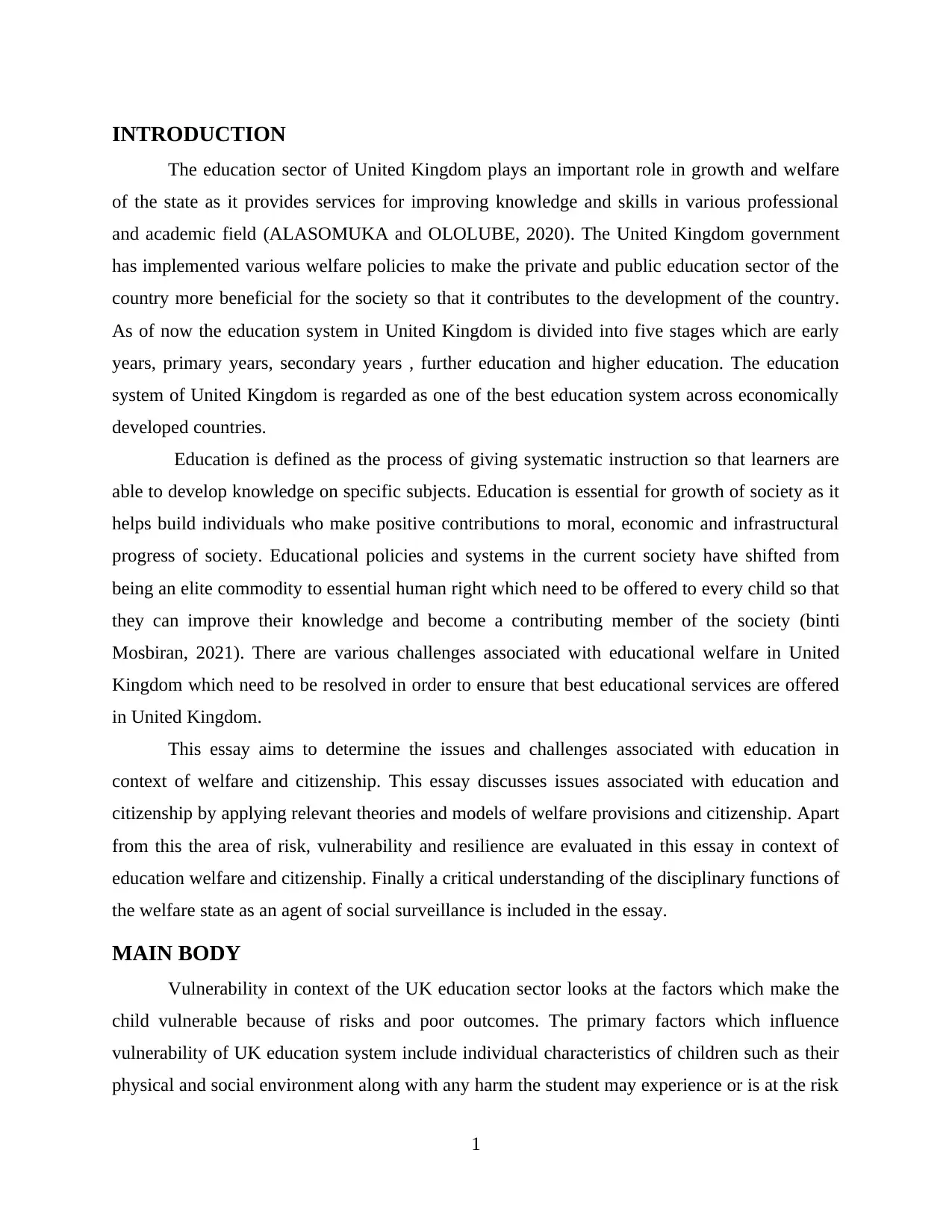
INTRODUCTION
The education sector of United Kingdom plays an important role in growth and welfare
of the state as it provides services for improving knowledge and skills in various professional
and academic field (ALASOMUKA and OLOLUBE, 2020). The United Kingdom government
has implemented various welfare policies to make the private and public education sector of the
country more beneficial for the society so that it contributes to the development of the country.
As of now the education system in United Kingdom is divided into five stages which are early
years, primary years, secondary years , further education and higher education. The education
system of United Kingdom is regarded as one of the best education system across economically
developed countries.
Education is defined as the process of giving systematic instruction so that learners are
able to develop knowledge on specific subjects. Education is essential for growth of society as it
helps build individuals who make positive contributions to moral, economic and infrastructural
progress of society. Educational policies and systems in the current society have shifted from
being an elite commodity to essential human right which need to be offered to every child so that
they can improve their knowledge and become a contributing member of the society (binti
Mosbiran, 2021). There are various challenges associated with educational welfare in United
Kingdom which need to be resolved in order to ensure that best educational services are offered
in United Kingdom.
This essay aims to determine the issues and challenges associated with education in
context of welfare and citizenship. This essay discusses issues associated with education and
citizenship by applying relevant theories and models of welfare provisions and citizenship. Apart
from this the area of risk, vulnerability and resilience are evaluated in this essay in context of
education welfare and citizenship. Finally a critical understanding of the disciplinary functions of
the welfare state as an agent of social surveillance is included in the essay.
MAIN BODY
Vulnerability in context of the UK education sector looks at the factors which make the
child vulnerable because of risks and poor outcomes. The primary factors which influence
vulnerability of UK education system include individual characteristics of children such as their
physical and social environment along with any harm the student may experience or is at the risk
1
The education sector of United Kingdom plays an important role in growth and welfare
of the state as it provides services for improving knowledge and skills in various professional
and academic field (ALASOMUKA and OLOLUBE, 2020). The United Kingdom government
has implemented various welfare policies to make the private and public education sector of the
country more beneficial for the society so that it contributes to the development of the country.
As of now the education system in United Kingdom is divided into five stages which are early
years, primary years, secondary years , further education and higher education. The education
system of United Kingdom is regarded as one of the best education system across economically
developed countries.
Education is defined as the process of giving systematic instruction so that learners are
able to develop knowledge on specific subjects. Education is essential for growth of society as it
helps build individuals who make positive contributions to moral, economic and infrastructural
progress of society. Educational policies and systems in the current society have shifted from
being an elite commodity to essential human right which need to be offered to every child so that
they can improve their knowledge and become a contributing member of the society (binti
Mosbiran, 2021). There are various challenges associated with educational welfare in United
Kingdom which need to be resolved in order to ensure that best educational services are offered
in United Kingdom.
This essay aims to determine the issues and challenges associated with education in
context of welfare and citizenship. This essay discusses issues associated with education and
citizenship by applying relevant theories and models of welfare provisions and citizenship. Apart
from this the area of risk, vulnerability and resilience are evaluated in this essay in context of
education welfare and citizenship. Finally a critical understanding of the disciplinary functions of
the welfare state as an agent of social surveillance is included in the essay.
MAIN BODY
Vulnerability in context of the UK education sector looks at the factors which make the
child vulnerable because of risks and poor outcomes. The primary factors which influence
vulnerability of UK education system include individual characteristics of children such as their
physical and social environment along with any harm the student may experience or is at the risk
1
⊘ This is a preview!⊘
Do you want full access?
Subscribe today to unlock all pages.

Trusted by 1+ million students worldwide
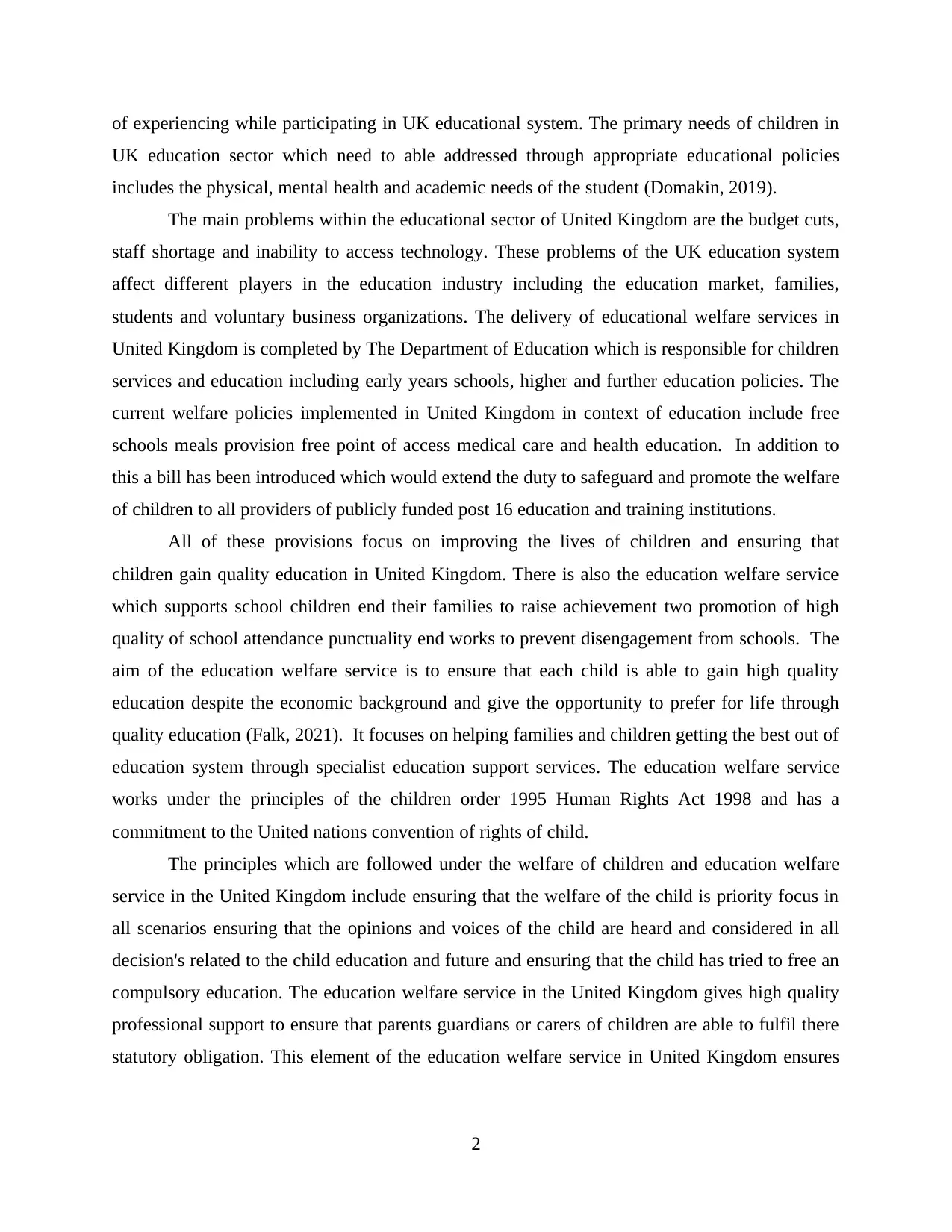
of experiencing while participating in UK educational system. The primary needs of children in
UK education sector which need to able addressed through appropriate educational policies
includes the physical, mental health and academic needs of the student (Domakin, 2019).
The main problems within the educational sector of United Kingdom are the budget cuts,
staff shortage and inability to access technology. These problems of the UK education system
affect different players in the education industry including the education market, families,
students and voluntary business organizations. The delivery of educational welfare services in
United Kingdom is completed by The Department of Education which is responsible for children
services and education including early years schools, higher and further education policies. The
current welfare policies implemented in United Kingdom in context of education include free
schools meals provision free point of access medical care and health education. In addition to
this a bill has been introduced which would extend the duty to safeguard and promote the welfare
of children to all providers of publicly funded post 16 education and training institutions.
All of these provisions focus on improving the lives of children and ensuring that
children gain quality education in United Kingdom. There is also the education welfare service
which supports school children end their families to raise achievement two promotion of high
quality of school attendance punctuality end works to prevent disengagement from schools. The
aim of the education welfare service is to ensure that each child is able to gain high quality
education despite the economic background and give the opportunity to prefer for life through
quality education (Falk, 2021). It focuses on helping families and children getting the best out of
education system through specialist education support services. The education welfare service
works under the principles of the children order 1995 Human Rights Act 1998 and has a
commitment to the United nations convention of rights of child.
The principles which are followed under the welfare of children and education welfare
service in the United Kingdom include ensuring that the welfare of the child is priority focus in
all scenarios ensuring that the opinions and voices of the child are heard and considered in all
decision's related to the child education and future and ensuring that the child has tried to free an
compulsory education. The education welfare service in the United Kingdom gives high quality
professional support to ensure that parents guardians or carers of children are able to fulfil there
statutory obligation. This element of the education welfare service in United Kingdom ensures
2
UK education sector which need to able addressed through appropriate educational policies
includes the physical, mental health and academic needs of the student (Domakin, 2019).
The main problems within the educational sector of United Kingdom are the budget cuts,
staff shortage and inability to access technology. These problems of the UK education system
affect different players in the education industry including the education market, families,
students and voluntary business organizations. The delivery of educational welfare services in
United Kingdom is completed by The Department of Education which is responsible for children
services and education including early years schools, higher and further education policies. The
current welfare policies implemented in United Kingdom in context of education include free
schools meals provision free point of access medical care and health education. In addition to
this a bill has been introduced which would extend the duty to safeguard and promote the welfare
of children to all providers of publicly funded post 16 education and training institutions.
All of these provisions focus on improving the lives of children and ensuring that
children gain quality education in United Kingdom. There is also the education welfare service
which supports school children end their families to raise achievement two promotion of high
quality of school attendance punctuality end works to prevent disengagement from schools. The
aim of the education welfare service is to ensure that each child is able to gain high quality
education despite the economic background and give the opportunity to prefer for life through
quality education (Falk, 2021). It focuses on helping families and children getting the best out of
education system through specialist education support services. The education welfare service
works under the principles of the children order 1995 Human Rights Act 1998 and has a
commitment to the United nations convention of rights of child.
The principles which are followed under the welfare of children and education welfare
service in the United Kingdom include ensuring that the welfare of the child is priority focus in
all scenarios ensuring that the opinions and voices of the child are heard and considered in all
decision's related to the child education and future and ensuring that the child has tried to free an
compulsory education. The education welfare service in the United Kingdom gives high quality
professional support to ensure that parents guardians or carers of children are able to fulfil there
statutory obligation. This element of the education welfare service in United Kingdom ensures
2
Paraphrase This Document
Need a fresh take? Get an instant paraphrase of this document with our AI Paraphraser
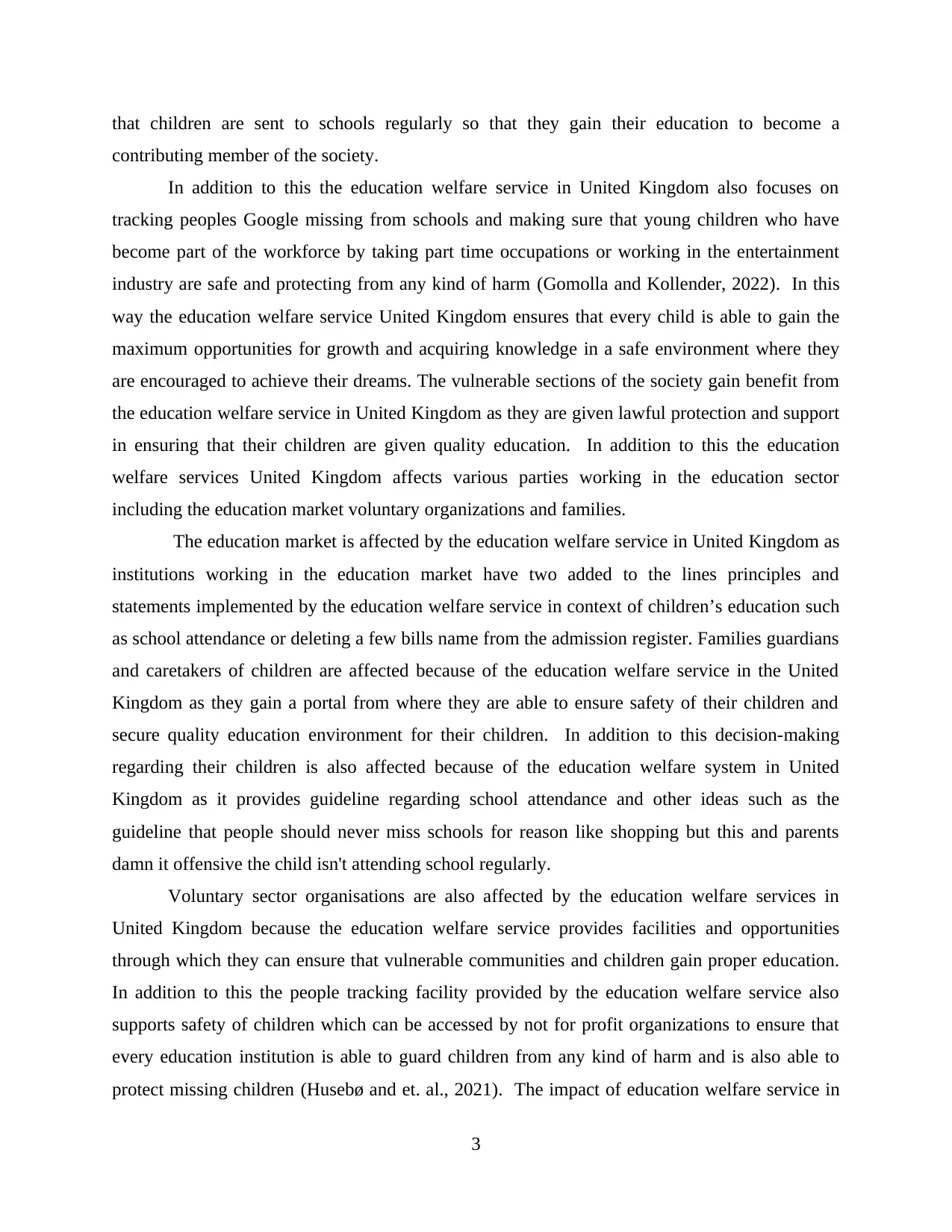
that children are sent to schools regularly so that they gain their education to become a
contributing member of the society.
In addition to this the education welfare service in United Kingdom also focuses on
tracking peoples Google missing from schools and making sure that young children who have
become part of the workforce by taking part time occupations or working in the entertainment
industry are safe and protecting from any kind of harm (Gomolla and Kollender, 2022). In this
way the education welfare service United Kingdom ensures that every child is able to gain the
maximum opportunities for growth and acquiring knowledge in a safe environment where they
are encouraged to achieve their dreams. The vulnerable sections of the society gain benefit from
the education welfare service in United Kingdom as they are given lawful protection and support
in ensuring that their children are given quality education. In addition to this the education
welfare services United Kingdom affects various parties working in the education sector
including the education market voluntary organizations and families.
The education market is affected by the education welfare service in United Kingdom as
institutions working in the education market have two added to the lines principles and
statements implemented by the education welfare service in context of children’s education such
as school attendance or deleting a few bills name from the admission register. Families guardians
and caretakers of children are affected because of the education welfare service in the United
Kingdom as they gain a portal from where they are able to ensure safety of their children and
secure quality education environment for their children. In addition to this decision-making
regarding their children is also affected because of the education welfare system in United
Kingdom as it provides guideline regarding school attendance and other ideas such as the
guideline that people should never miss schools for reason like shopping but this and parents
damn it offensive the child isn't attending school regularly.
Voluntary sector organisations are also affected by the education welfare services in
United Kingdom because the education welfare service provides facilities and opportunities
through which they can ensure that vulnerable communities and children gain proper education.
In addition to this the people tracking facility provided by the education welfare service also
supports safety of children which can be accessed by not for profit organizations to ensure that
every education institution is able to guard children from any kind of harm and is also able to
protect missing children (Husebø and et. al., 2021). The impact of education welfare service in
3
contributing member of the society.
In addition to this the education welfare service in United Kingdom also focuses on
tracking peoples Google missing from schools and making sure that young children who have
become part of the workforce by taking part time occupations or working in the entertainment
industry are safe and protecting from any kind of harm (Gomolla and Kollender, 2022). In this
way the education welfare service United Kingdom ensures that every child is able to gain the
maximum opportunities for growth and acquiring knowledge in a safe environment where they
are encouraged to achieve their dreams. The vulnerable sections of the society gain benefit from
the education welfare service in United Kingdom as they are given lawful protection and support
in ensuring that their children are given quality education. In addition to this the education
welfare services United Kingdom affects various parties working in the education sector
including the education market voluntary organizations and families.
The education market is affected by the education welfare service in United Kingdom as
institutions working in the education market have two added to the lines principles and
statements implemented by the education welfare service in context of children’s education such
as school attendance or deleting a few bills name from the admission register. Families guardians
and caretakers of children are affected because of the education welfare service in the United
Kingdom as they gain a portal from where they are able to ensure safety of their children and
secure quality education environment for their children. In addition to this decision-making
regarding their children is also affected because of the education welfare system in United
Kingdom as it provides guideline regarding school attendance and other ideas such as the
guideline that people should never miss schools for reason like shopping but this and parents
damn it offensive the child isn't attending school regularly.
Voluntary sector organisations are also affected by the education welfare services in
United Kingdom because the education welfare service provides facilities and opportunities
through which they can ensure that vulnerable communities and children gain proper education.
In addition to this the people tracking facility provided by the education welfare service also
supports safety of children which can be accessed by not for profit organizations to ensure that
every education institution is able to guard children from any kind of harm and is also able to
protect missing children (Husebø and et. al., 2021). The impact of education welfare service in
3
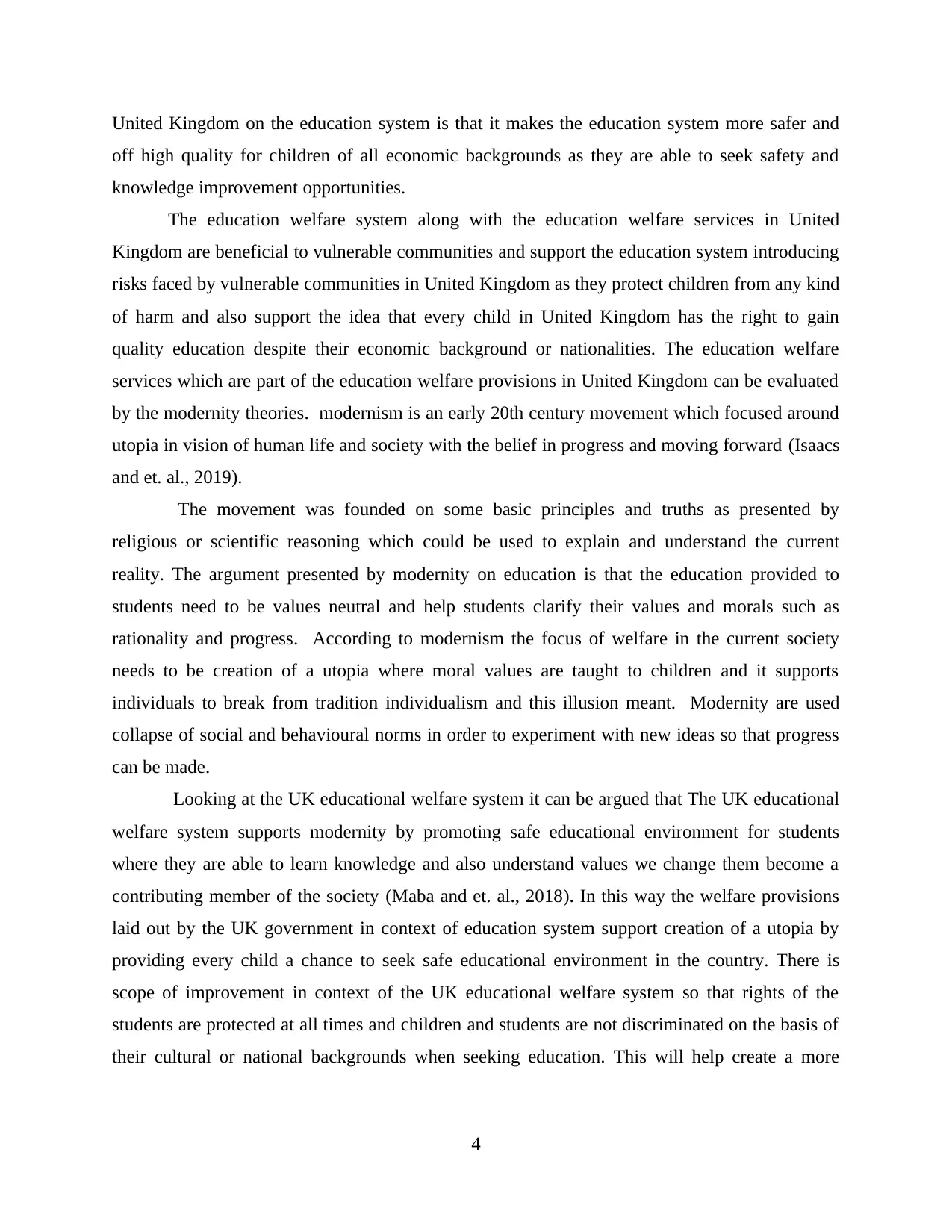
United Kingdom on the education system is that it makes the education system more safer and
off high quality for children of all economic backgrounds as they are able to seek safety and
knowledge improvement opportunities.
The education welfare system along with the education welfare services in United
Kingdom are beneficial to vulnerable communities and support the education system introducing
risks faced by vulnerable communities in United Kingdom as they protect children from any kind
of harm and also support the idea that every child in United Kingdom has the right to gain
quality education despite their economic background or nationalities. The education welfare
services which are part of the education welfare provisions in United Kingdom can be evaluated
by the modernity theories. modernism is an early 20th century movement which focused around
utopia in vision of human life and society with the belief in progress and moving forward (Isaacs
and et. al., 2019).
The movement was founded on some basic principles and truths as presented by
religious or scientific reasoning which could be used to explain and understand the current
reality. The argument presented by modernity on education is that the education provided to
students need to be values neutral and help students clarify their values and morals such as
rationality and progress. According to modernism the focus of welfare in the current society
needs to be creation of a utopia where moral values are taught to children and it supports
individuals to break from tradition individualism and this illusion meant. Modernity are used
collapse of social and behavioural norms in order to experiment with new ideas so that progress
can be made.
Looking at the UK educational welfare system it can be argued that The UK educational
welfare system supports modernity by promoting safe educational environment for students
where they are able to learn knowledge and also understand values we change them become a
contributing member of the society (Maba and et. al., 2018). In this way the welfare provisions
laid out by the UK government in context of education system support creation of a utopia by
providing every child a chance to seek safe educational environment in the country. There is
scope of improvement in context of the UK educational welfare system so that rights of the
students are protected at all times and children and students are not discriminated on the basis of
their cultural or national backgrounds when seeking education. This will help create a more
4
off high quality for children of all economic backgrounds as they are able to seek safety and
knowledge improvement opportunities.
The education welfare system along with the education welfare services in United
Kingdom are beneficial to vulnerable communities and support the education system introducing
risks faced by vulnerable communities in United Kingdom as they protect children from any kind
of harm and also support the idea that every child in United Kingdom has the right to gain
quality education despite their economic background or nationalities. The education welfare
services which are part of the education welfare provisions in United Kingdom can be evaluated
by the modernity theories. modernism is an early 20th century movement which focused around
utopia in vision of human life and society with the belief in progress and moving forward (Isaacs
and et. al., 2019).
The movement was founded on some basic principles and truths as presented by
religious or scientific reasoning which could be used to explain and understand the current
reality. The argument presented by modernity on education is that the education provided to
students need to be values neutral and help students clarify their values and morals such as
rationality and progress. According to modernism the focus of welfare in the current society
needs to be creation of a utopia where moral values are taught to children and it supports
individuals to break from tradition individualism and this illusion meant. Modernity are used
collapse of social and behavioural norms in order to experiment with new ideas so that progress
can be made.
Looking at the UK educational welfare system it can be argued that The UK educational
welfare system supports modernity by promoting safe educational environment for students
where they are able to learn knowledge and also understand values we change them become a
contributing member of the society (Maba and et. al., 2018). In this way the welfare provisions
laid out by the UK government in context of education system support creation of a utopia by
providing every child a chance to seek safe educational environment in the country. There is
scope of improvement in context of the UK educational welfare system so that rights of the
students are protected at all times and children and students are not discriminated on the basis of
their cultural or national backgrounds when seeking education. This will help create a more
4
⊘ This is a preview!⊘
Do you want full access?
Subscribe today to unlock all pages.

Trusted by 1+ million students worldwide
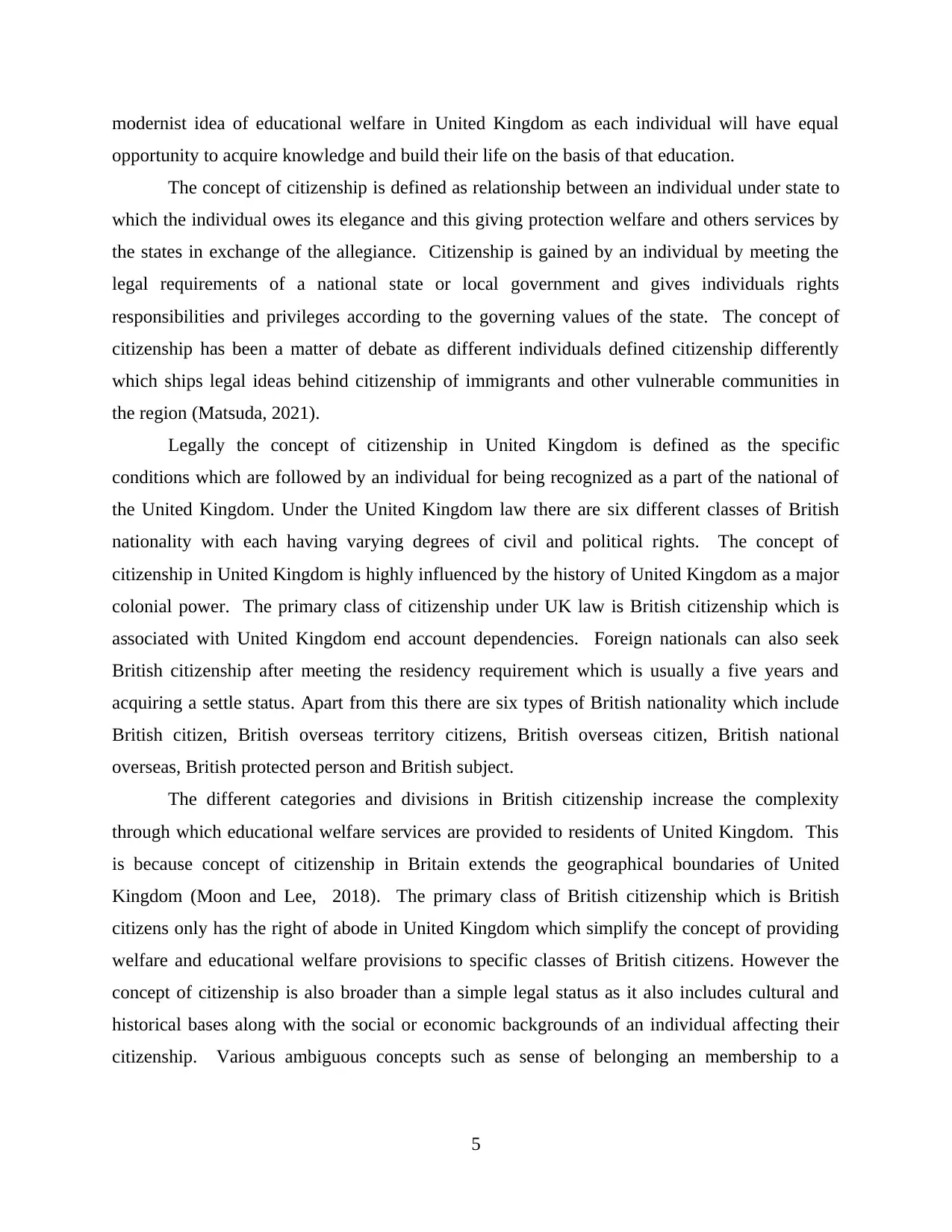
modernist idea of educational welfare in United Kingdom as each individual will have equal
opportunity to acquire knowledge and build their life on the basis of that education.
The concept of citizenship is defined as relationship between an individual under state to
which the individual owes its elegance and this giving protection welfare and others services by
the states in exchange of the allegiance. Citizenship is gained by an individual by meeting the
legal requirements of a national state or local government and gives individuals rights
responsibilities and privileges according to the governing values of the state. The concept of
citizenship has been a matter of debate as different individuals defined citizenship differently
which ships legal ideas behind citizenship of immigrants and other vulnerable communities in
the region (Matsuda, 2021).
Legally the concept of citizenship in United Kingdom is defined as the specific
conditions which are followed by an individual for being recognized as a part of the national of
the United Kingdom. Under the United Kingdom law there are six different classes of British
nationality with each having varying degrees of civil and political rights. The concept of
citizenship in United Kingdom is highly influenced by the history of United Kingdom as a major
colonial power. The primary class of citizenship under UK law is British citizenship which is
associated with United Kingdom end account dependencies. Foreign nationals can also seek
British citizenship after meeting the residency requirement which is usually a five years and
acquiring a settle status. Apart from this there are six types of British nationality which include
British citizen, British overseas territory citizens, British overseas citizen, British national
overseas, British protected person and British subject.
The different categories and divisions in British citizenship increase the complexity
through which educational welfare services are provided to residents of United Kingdom. This
is because concept of citizenship in Britain extends the geographical boundaries of United
Kingdom (Moon and Lee, 2018). The primary class of British citizenship which is British
citizens only has the right of abode in United Kingdom which simplify the concept of providing
welfare and educational welfare provisions to specific classes of British citizens. However the
concept of citizenship is also broader than a simple legal status as it also includes cultural and
historical bases along with the social or economic backgrounds of an individual affecting their
citizenship. Various ambiguous concepts such as sense of belonging an membership to a
5
opportunity to acquire knowledge and build their life on the basis of that education.
The concept of citizenship is defined as relationship between an individual under state to
which the individual owes its elegance and this giving protection welfare and others services by
the states in exchange of the allegiance. Citizenship is gained by an individual by meeting the
legal requirements of a national state or local government and gives individuals rights
responsibilities and privileges according to the governing values of the state. The concept of
citizenship has been a matter of debate as different individuals defined citizenship differently
which ships legal ideas behind citizenship of immigrants and other vulnerable communities in
the region (Matsuda, 2021).
Legally the concept of citizenship in United Kingdom is defined as the specific
conditions which are followed by an individual for being recognized as a part of the national of
the United Kingdom. Under the United Kingdom law there are six different classes of British
nationality with each having varying degrees of civil and political rights. The concept of
citizenship in United Kingdom is highly influenced by the history of United Kingdom as a major
colonial power. The primary class of citizenship under UK law is British citizenship which is
associated with United Kingdom end account dependencies. Foreign nationals can also seek
British citizenship after meeting the residency requirement which is usually a five years and
acquiring a settle status. Apart from this there are six types of British nationality which include
British citizen, British overseas territory citizens, British overseas citizen, British national
overseas, British protected person and British subject.
The different categories and divisions in British citizenship increase the complexity
through which educational welfare services are provided to residents of United Kingdom. This
is because concept of citizenship in Britain extends the geographical boundaries of United
Kingdom (Moon and Lee, 2018). The primary class of British citizenship which is British
citizens only has the right of abode in United Kingdom which simplify the concept of providing
welfare and educational welfare provisions to specific classes of British citizens. However the
concept of citizenship is also broader than a simple legal status as it also includes cultural and
historical bases along with the social or economic backgrounds of an individual affecting their
citizenship. Various ambiguous concepts such as sense of belonging an membership to a
5
Paraphrase This Document
Need a fresh take? Get an instant paraphrase of this document with our AI Paraphraser
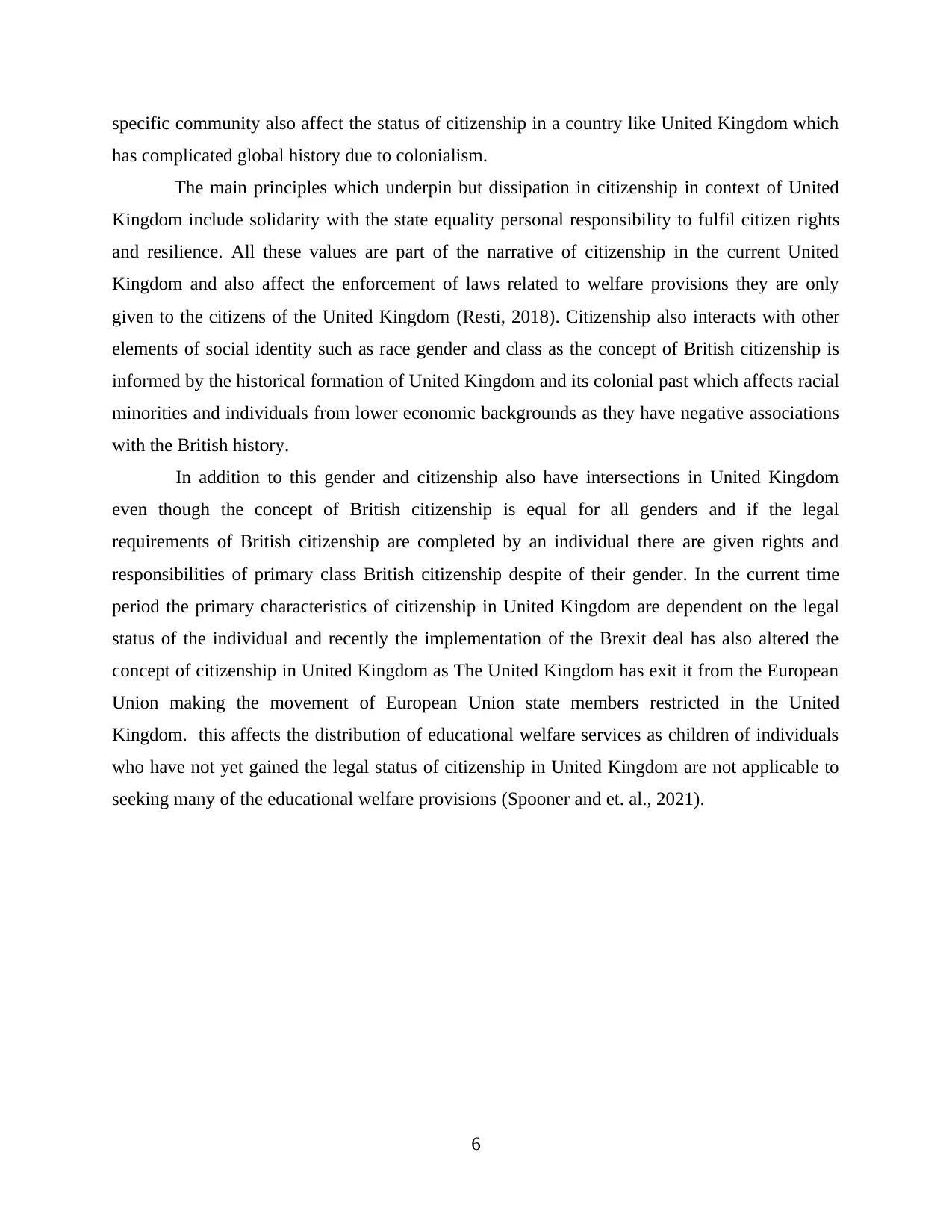
specific community also affect the status of citizenship in a country like United Kingdom which
has complicated global history due to colonialism.
The main principles which underpin but dissipation in citizenship in context of United
Kingdom include solidarity with the state equality personal responsibility to fulfil citizen rights
and resilience. All these values are part of the narrative of citizenship in the current United
Kingdom and also affect the enforcement of laws related to welfare provisions they are only
given to the citizens of the United Kingdom (Resti, 2018). Citizenship also interacts with other
elements of social identity such as race gender and class as the concept of British citizenship is
informed by the historical formation of United Kingdom and its colonial past which affects racial
minorities and individuals from lower economic backgrounds as they have negative associations
with the British history.
In addition to this gender and citizenship also have intersections in United Kingdom
even though the concept of British citizenship is equal for all genders and if the legal
requirements of British citizenship are completed by an individual there are given rights and
responsibilities of primary class British citizenship despite of their gender. In the current time
period the primary characteristics of citizenship in United Kingdom are dependent on the legal
status of the individual and recently the implementation of the Brexit deal has also altered the
concept of citizenship in United Kingdom as The United Kingdom has exit it from the European
Union making the movement of European Union state members restricted in the United
Kingdom. this affects the distribution of educational welfare services as children of individuals
who have not yet gained the legal status of citizenship in United Kingdom are not applicable to
seeking many of the educational welfare provisions (Spooner and et. al., 2021).
6
has complicated global history due to colonialism.
The main principles which underpin but dissipation in citizenship in context of United
Kingdom include solidarity with the state equality personal responsibility to fulfil citizen rights
and resilience. All these values are part of the narrative of citizenship in the current United
Kingdom and also affect the enforcement of laws related to welfare provisions they are only
given to the citizens of the United Kingdom (Resti, 2018). Citizenship also interacts with other
elements of social identity such as race gender and class as the concept of British citizenship is
informed by the historical formation of United Kingdom and its colonial past which affects racial
minorities and individuals from lower economic backgrounds as they have negative associations
with the British history.
In addition to this gender and citizenship also have intersections in United Kingdom
even though the concept of British citizenship is equal for all genders and if the legal
requirements of British citizenship are completed by an individual there are given rights and
responsibilities of primary class British citizenship despite of their gender. In the current time
period the primary characteristics of citizenship in United Kingdom are dependent on the legal
status of the individual and recently the implementation of the Brexit deal has also altered the
concept of citizenship in United Kingdom as The United Kingdom has exit it from the European
Union making the movement of European Union state members restricted in the United
Kingdom. this affects the distribution of educational welfare services as children of individuals
who have not yet gained the legal status of citizenship in United Kingdom are not applicable to
seeking many of the educational welfare provisions (Spooner and et. al., 2021).
6

7
⊘ This is a preview!⊘
Do you want full access?
Subscribe today to unlock all pages.

Trusted by 1+ million students worldwide
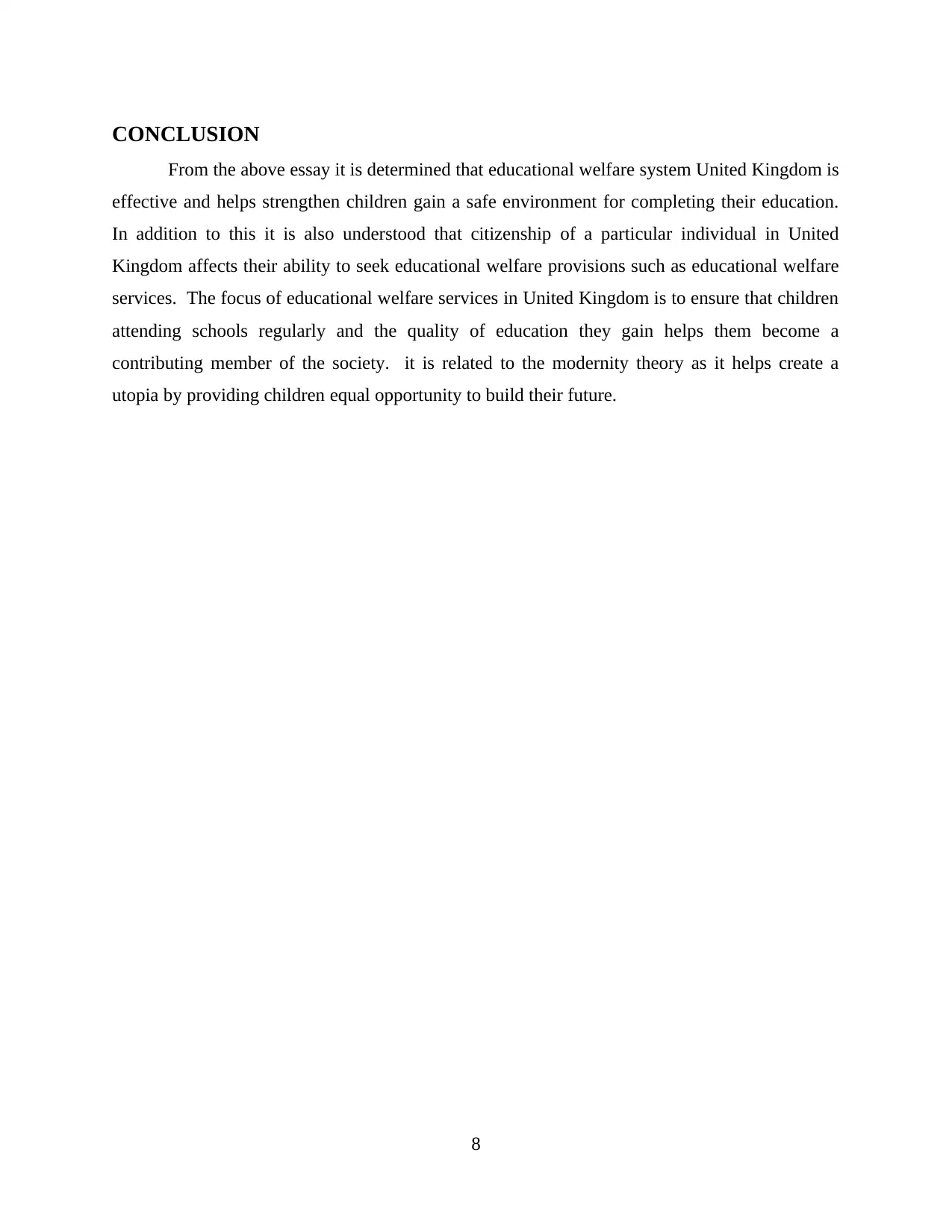
CONCLUSION
From the above essay it is determined that educational welfare system United Kingdom is
effective and helps strengthen children gain a safe environment for completing their education.
In addition to this it is also understood that citizenship of a particular individual in United
Kingdom affects their ability to seek educational welfare provisions such as educational welfare
services. The focus of educational welfare services in United Kingdom is to ensure that children
attending schools regularly and the quality of education they gain helps them become a
contributing member of the society. it is related to the modernity theory as it helps create a
utopia by providing children equal opportunity to build their future.
8
From the above essay it is determined that educational welfare system United Kingdom is
effective and helps strengthen children gain a safe environment for completing their education.
In addition to this it is also understood that citizenship of a particular individual in United
Kingdom affects their ability to seek educational welfare provisions such as educational welfare
services. The focus of educational welfare services in United Kingdom is to ensure that children
attending schools regularly and the quality of education they gain helps them become a
contributing member of the society. it is related to the modernity theory as it helps create a
utopia by providing children equal opportunity to build their future.
8
Paraphrase This Document
Need a fresh take? Get an instant paraphrase of this document with our AI Paraphraser
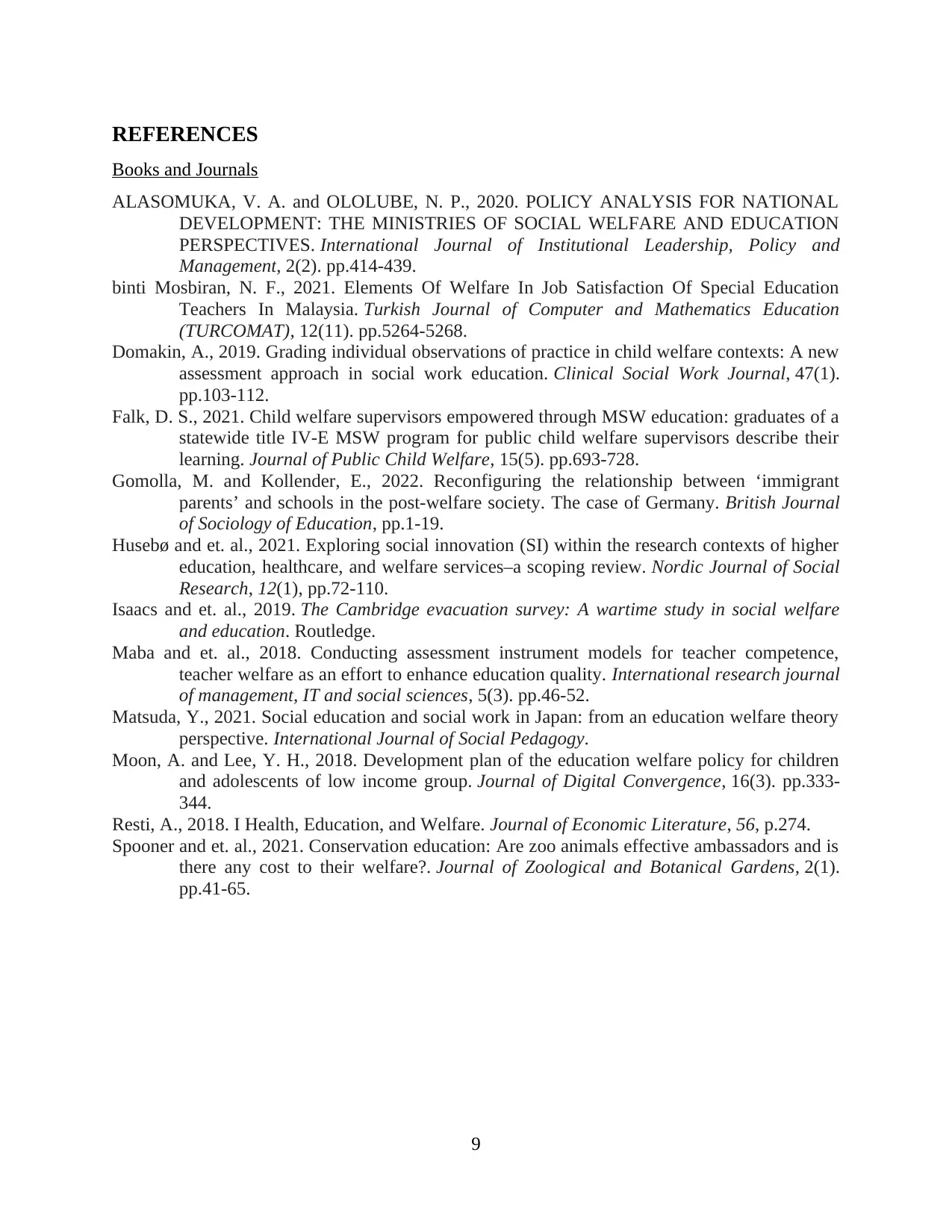
REFERENCES
Books and Journals
ALASOMUKA, V. A. and OLOLUBE, N. P., 2020. POLICY ANALYSIS FOR NATIONAL
DEVELOPMENT: THE MINISTRIES OF SOCIAL WELFARE AND EDUCATION
PERSPECTIVES. International Journal of Institutional Leadership, Policy and
Management, 2(2). pp.414-439.
binti Mosbiran, N. F., 2021. Elements Of Welfare In Job Satisfaction Of Special Education
Teachers In Malaysia. Turkish Journal of Computer and Mathematics Education
(TURCOMAT), 12(11). pp.5264-5268.
Domakin, A., 2019. Grading individual observations of practice in child welfare contexts: A new
assessment approach in social work education. Clinical Social Work Journal, 47(1).
pp.103-112.
Falk, D. S., 2021. Child welfare supervisors empowered through MSW education: graduates of a
statewide title IV-E MSW program for public child welfare supervisors describe their
learning. Journal of Public Child Welfare, 15(5). pp.693-728.
Gomolla, M. and Kollender, E., 2022. Reconfiguring the relationship between ‘immigrant
parents’ and schools in the post-welfare society. The case of Germany. British Journal
of Sociology of Education, pp.1-19.
Husebø and et. al., 2021. Exploring social innovation (SI) within the research contexts of higher
education, healthcare, and welfare services–a scoping review. Nordic Journal of Social
Research, 12(1), pp.72-110.
Isaacs and et. al., 2019. The Cambridge evacuation survey: A wartime study in social welfare
and education. Routledge.
Maba and et. al., 2018. Conducting assessment instrument models for teacher competence,
teacher welfare as an effort to enhance education quality. International research journal
of management, IT and social sciences, 5(3). pp.46-52.
Matsuda, Y., 2021. Social education and social work in Japan: from an education welfare theory
perspective. International Journal of Social Pedagogy.
Moon, A. and Lee, Y. H., 2018. Development plan of the education welfare policy for children
and adolescents of low income group. Journal of Digital Convergence, 16(3). pp.333-
344.
Resti, A., 2018. I Health, Education, and Welfare. Journal of Economic Literature, 56, p.274.
Spooner and et. al., 2021. Conservation education: Are zoo animals effective ambassadors and is
there any cost to their welfare?. Journal of Zoological and Botanical Gardens, 2(1).
pp.41-65.
9
Books and Journals
ALASOMUKA, V. A. and OLOLUBE, N. P., 2020. POLICY ANALYSIS FOR NATIONAL
DEVELOPMENT: THE MINISTRIES OF SOCIAL WELFARE AND EDUCATION
PERSPECTIVES. International Journal of Institutional Leadership, Policy and
Management, 2(2). pp.414-439.
binti Mosbiran, N. F., 2021. Elements Of Welfare In Job Satisfaction Of Special Education
Teachers In Malaysia. Turkish Journal of Computer and Mathematics Education
(TURCOMAT), 12(11). pp.5264-5268.
Domakin, A., 2019. Grading individual observations of practice in child welfare contexts: A new
assessment approach in social work education. Clinical Social Work Journal, 47(1).
pp.103-112.
Falk, D. S., 2021. Child welfare supervisors empowered through MSW education: graduates of a
statewide title IV-E MSW program for public child welfare supervisors describe their
learning. Journal of Public Child Welfare, 15(5). pp.693-728.
Gomolla, M. and Kollender, E., 2022. Reconfiguring the relationship between ‘immigrant
parents’ and schools in the post-welfare society. The case of Germany. British Journal
of Sociology of Education, pp.1-19.
Husebø and et. al., 2021. Exploring social innovation (SI) within the research contexts of higher
education, healthcare, and welfare services–a scoping review. Nordic Journal of Social
Research, 12(1), pp.72-110.
Isaacs and et. al., 2019. The Cambridge evacuation survey: A wartime study in social welfare
and education. Routledge.
Maba and et. al., 2018. Conducting assessment instrument models for teacher competence,
teacher welfare as an effort to enhance education quality. International research journal
of management, IT and social sciences, 5(3). pp.46-52.
Matsuda, Y., 2021. Social education and social work in Japan: from an education welfare theory
perspective. International Journal of Social Pedagogy.
Moon, A. and Lee, Y. H., 2018. Development plan of the education welfare policy for children
and adolescents of low income group. Journal of Digital Convergence, 16(3). pp.333-
344.
Resti, A., 2018. I Health, Education, and Welfare. Journal of Economic Literature, 56, p.274.
Spooner and et. al., 2021. Conservation education: Are zoo animals effective ambassadors and is
there any cost to their welfare?. Journal of Zoological and Botanical Gardens, 2(1).
pp.41-65.
9
1 out of 11
Related Documents
Your All-in-One AI-Powered Toolkit for Academic Success.
+13062052269
info@desklib.com
Available 24*7 on WhatsApp / Email
![[object Object]](/_next/static/media/star-bottom.7253800d.svg)
Unlock your academic potential
Copyright © 2020–2026 A2Z Services. All Rights Reserved. Developed and managed by ZUCOL.





